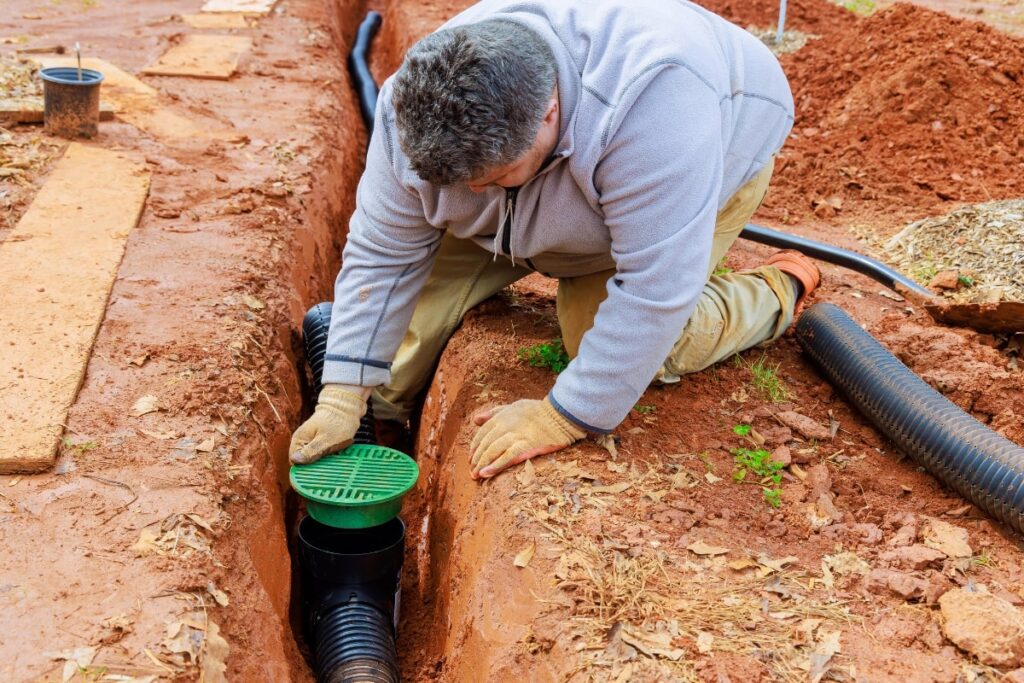Proper maintenance of sewer lines and French drains is crucial to prevent common plumbing issues like clogs, water backups, and costly damage. Sewer lines transport waste and wastewater away from the home, while French drains manage groundwater, directing it away from foundations to prevent flooding and erosion. Over time, both systems can become blocked by debris, sediment, and roots, leading to inefficient drainage and potential hazards for the home.
For homeowners seeking expert assistance, professional services like Ares Plumbing offer specialized sewer line and French drain cleaning solutions to maintain efficient water flow and protect property. Here’s a closer look at the importance of regular cleaning for these systems and tips for keeping them in optimal condition.
1. Understanding the Role of Sewer Lines and French Drains
Sewer lines and French drains play distinct but complementary roles in managing water and waste. While sewer lines are part of the home’s main plumbing system, carrying waste to municipal sewers, French drains focus on managing surface and groundwater around the property. Regular cleaning of both systems is essential to prevent blockages and maintain a safe environment.
Key Functions of Each System
- Sewer Lines: These lines remove wastewater from sinks, showers, toilets, and appliances, ensuring it flows smoothly to the municipal sewer system or septic tank.
- French Drains: These underground trenches are filled with gravel and pipes to direct water away from the foundation, protecting the home from water damage and erosion.
By understanding the role of each system, homeowners can better appreciate the need for regular cleaning to maintain effective operation and prevent costly repairs.
2. Common Causes of Blockages in Sewer Lines
Sewer line blockages are often caused by the accumulation of waste materials, grease, and foreign objects. However, natural elements like tree roots and sediment can also obstruct sewer lines, disrupting the entire plumbing system. Recognizing common causes of sewer line blockages can help homeowners take preventive measures.
Causes of Sewer Line Clogs
- Grease and Food Waste: Fats and oils from the kitchen can solidify within sewer lines, leading to blockages over time.
- Tree Root Intrusion: Tree roots naturally seek moisture and may grow into sewer lines, causing cracks or obstructing flow.
- Foreign Objects: Items like wipes, feminine hygiene products, and small objects accidentally flushed down the toilet can create blockages.
Regular sewer line cleaning helps prevent these blockages, keeping wastewater flowing efficiently and reducing the risk of backups.
3. How French Drains Become Clogged
French drains, designed to channel water away from foundations, can become blocked with sediment, leaves, and other organic debris. When these drains are clogged, water may accumulate around the foundation, leading to potential flooding and soil erosion. Understanding how French drains clog and taking steps to keep them clear is essential for maintaining a dry, stable property.
Causes of French Drain Blockages
- Sediment Buildup: Over time, fine soil particles and silt can fill the gravel and pipes in French drains, reducing their effectiveness.
- Leaves and Organic Debris: Falling leaves, twigs, and plant debris can clog French drains, especially in the fall season.
- Improper Installation: Poorly designed or installed French drains may clog more easily or fail to channel water effectively.
Regular maintenance prevents debris buildup, ensuring that French drains function efficiently and protect the property from water-related damage.
4. Signs It’s Time to Clean Your Sewer Line
Sewer lines typically need cleaning every 18-24 months, though more frequent cleaning may be necessary if blockages are a recurring issue. Recognizing the warning signs of a clogged sewer line helps homeowners address problems before they escalate.
Indicators of a Clogged Sewer Line
- Frequent Backups: If toilets or drains are backing up frequently, this is often a sign of a blockage in the main sewer line.
- Slow Draining: Slow-moving water in multiple drains, especially on lower floors, can indicate a sewer line issue.
- Unpleasant Odors: Foul smells from drains or outside the home may signal a buildup of waste in the sewer line.
Cleaning the sewer line when these signs appear helps prevent potential overflows and ensures a smoothly functioning plumbing system.
5. Recognizing When French Drains Need Maintenance
Since French drains are designed to manage groundwater, clogs are often hidden until water begins to pool around the foundation. Regular inspections and timely cleaning can prevent drainage issues, helping homeowners avoid costly repairs.
Warning Signs of a Clogged French Drain
- Standing Water: Puddles or standing water around the home’s foundation, especially after rain, indicate poor drainage, often due to a clogged French drain.
- Excess Moisture in Basement: Increased humidity or dampness in the basement could signal a blocked French drain, allowing water to seep in.
- Foundation Shifts or Cracks: In severe cases, blocked drains may lead to foundation shifts, causing visible cracks in walls or floors.
Cleaning the French drain when these signs appear can help avoid foundation damage and maintain a dry, stable home environment.
6. DIY Drain Maintenance Tips
While professional cleaning is essential for deep clogs, homeowners can perform regular maintenance to keep their sewer lines and French drains clear. Simple practices, such as avoiding certain materials in drains and conducting seasonal checks, can help prevent blockages.
Simple Maintenance Tips for Homeowners
- Mind What You Flush: Avoid flushing anything other than toilet paper to prevent sewer line clogs.
- Use Drain Strainers: Place strainers over sinks and showers to catch debris, preventing it from entering sewer lines.
- Seasonal Yard Cleanup: Clear leaves and debris from areas around the French drain to reduce the risk of clogging.
Routine maintenance helps keep drains functioning efficiently, reducing the need for frequent professional cleaning.
7. The Benefits of Professional Sewer Line and French Drain Cleaning
While DIY maintenance is helpful, professional cleaning is necessary to fully clear stubborn blockages and ensure efficient drainage. Plumbing professionals use specialized tools and techniques to remove clogs, providing a thorough and effective clean.
Why Hire a Professional for Drain Cleaning?
- Advanced Equipment: Professionals use high-pressure water jets, augers, and cameras to clear clogs and inspect sewer lines, achieving results that DIY methods can’t match.
- Accurate Diagnosis: Plumbers identify the exact cause and location of blockages, addressing the root of the problem to prevent future clogs.
- Prevents Damage: Professional cleaning prevents the risk of pipe damage from incorrect DIY methods, protecting the plumbing system.
Professional services like Ares Plumbing offer expertise in sewer line and French drain cleaning, helping homeowners keep their drainage systems functioning efficiently and reliably.
8. How Often to Schedule Professional Cleaning
The frequency of sewer line and French drain cleaning depends on several factors, including the age of the system, the number of residents in the home, and the presence of surrounding trees. For most households, scheduling professional cleaning every 1-2 years is a good rule of thumb.
Suggested Cleaning Frequency
- Sewer Lines: Plan for cleaning every 18-24 months, or sooner if your home experiences frequent clogs or slow drainage.
- French Drains: French drains generally require cleaning every 1-2 years, especially if the yard has a high amount of leaf litter or sediment.
Regular cleaning minimizes the risk of unexpected clogs and keeps the home’s plumbing system and foundation protected.
Conclusion: Protecting Your Home with Regular Drain Maintenance
Routine sewer line and French drain cleaning is essential for a functional, safe, and efficient home. By identifying common causes of blockages, recognizing the signs of clogged drains, and scheduling professional cleaning when necessary, homeowners can protect their property from water damage, unpleasant odors, and plumbing issues. For those needing assistance, Ares Plumbing provides specialized services that help maintain clean, effective drainage systems, safeguarding the integrity of the home.
With proactive maintenance and occasional professional cleaning, homeowners can enjoy a worry-free plumbing system, efficient drainage, and a healthier living environment.






